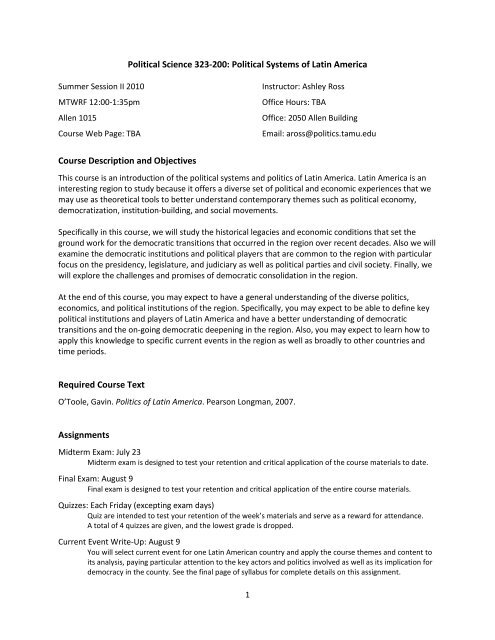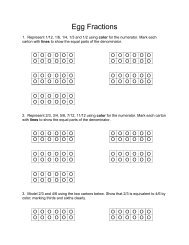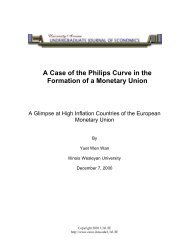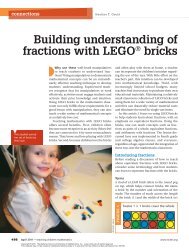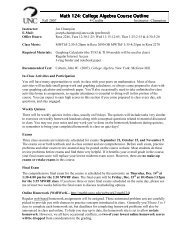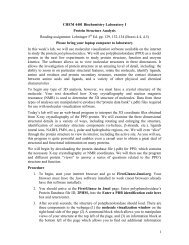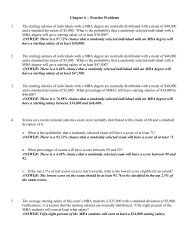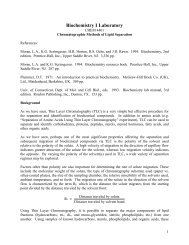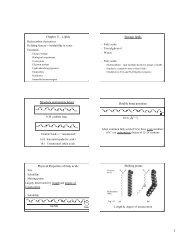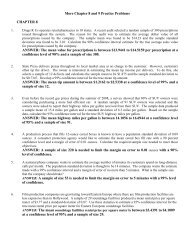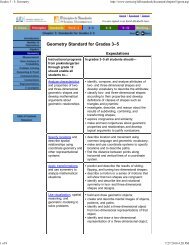Latin American Politics - Texas A&M University Corpus Christi ...
Latin American Politics - Texas A&M University Corpus Christi ...
Latin American Politics - Texas A&M University Corpus Christi ...
You also want an ePaper? Increase the reach of your titles
YUMPU automatically turns print PDFs into web optimized ePapers that Google loves.
Political Science 323-200: Political Systems of <strong>Latin</strong> AmericaSummer Session II 2010MTWRF 12:00-1:35pmAllen 1015Course Web Page: TBAInstructor: Ashley RossOffice Hours: TBAOffice: 2050 Allen BuildingEmail: aross@politics.tamu.eduCourse Description and ObjectivesThis course is an introduction of the political systems and politics of <strong>Latin</strong> America. <strong>Latin</strong> America is aninteresting region to study because it offers a diverse set of political and economic experiences that wemay use as theoretical tools to better understand contemporary themes such as political economy,democratization, institution-building, and social movements.Specifically in this course, we will study the historical legacies and economic conditions that set theground work for the democratic transitions that occurred in the region over recent decades. Also we willexamine the democratic institutions and political players that are common to the region with particularfocus on the presidency, legislature, and judiciary as well as political parties and civil society. Finally, wewill explore the challenges and promises of democratic consolidation in the region.At the end of this course, you may expect to have a general understanding of the diverse politics,economics, and political institutions of the region. Specifically, you may expect to be able to define keypolitical institutions and players of <strong>Latin</strong> America and have a better understanding of democratictransitions and the on-going democratic deepening in the region. Also, you may expect to learn how toapply this knowledge to specific current events in the region as well as broadly to other countries andtime periods.Required Course TextO’Toole, Gavin. <strong>Politics</strong> of <strong>Latin</strong> America. Pearson Longman, 2007.AssignmentsMidterm Exam: July 23Midterm exam is designed to test your retention and critical application of the course materials to date.Final Exam: August 9Final exam is designed to test your retention and critical application of the entire course materials.Quizzes: Each Friday (excepting exam days)Quiz are intended to test your retention of the week’s materials and serve as a reward for attendance.A total of 4 quizzes are given, and the lowest grade is dropped.Current Event Write-Up: August 9You will select current event for one <strong>Latin</strong> <strong>American</strong> country and apply the course themes and content toits analysis, paying particular attention to the key actors and politics involved as well as its implication fordemocracy in the county. See the final page of syllabus for complete details on this assignment.1
Grading PolicyI realize that course grades are not a perfect reflection of your performance in class. However, examsand written assignments are the best tool we have available to gauge your comprehension andapplication of the course materials. As such, I promise to do my best to make course exam andassignment expectations clear - in this syllabus and in class - and to grade fairly. The following outlinesmy grading policies.Final GradesFinal grades will be based on the following:30% Midterm Exam30% Final Exam15% Weekly Quizzes25% Current Event Write UpGrades will be assigned as follows:A = 89.5 - 100.0B = 79.5 - 89.4C = 69.5 - 79.4D = 59.5 - 69.4F = 59.4 and belowNo extra credit is available. No exceptions. Do not ask, really.Make-Up ExamsMake-up exams will be given only if the student has a university excused absence and followsuniversity guidelines for excused absences. See http://student-rules.tamu.edu/rule7.htm of thestudent rules for a list of excused absences. Note the following (Rule 7.3):“To be excused the student must notify his or her instructor in writing (acknowledged e-mail message is acceptable) prior to the date of absence if such notification is feasible.In cases where advance notification is not feasible (e.g. accident, or emergency) thestudent must provide notification by the end of the second working day after theabsence. This notification should include an explanation of why notice could not be sentprior to the class. If needed, the student must provide additional documentationsubstantiating the reason for the absence, that is satisfactory to the instructor, withinone week of the last date of the absence. If the absence is excused, the instructor musteither provide the student an opportunity to make up any quiz, exam or other gradedactivities or provide a satisfactory alternative to be completed within 30 calendar daysfrom the last day of the absence.”Late AssignmentsLate assignments will be penalized 10% (a letter grade) each 24 hours they are late. Make-upassignments will only be given if the student has a university excused absence, which is outlinedin the make-up assignment policy above.Grade ComplaintsIf you have a grade complaint, meet with me after class or during my office hours to submit arequest for a re-grade. You must bring a written request for the re-grade, including justificationfor re-grading the assignment as well as the graded original assignment. If your request islegitimate, I will re-grade the assignment and adjust the score accordingly - up or down.2
Classroom ExpectationsThis is what I expect of you as the student and you may expect of me as an instructor:Be prepared for class.− You have read the day’s lecture materials and completed any assignments due that day.− I have thoroughly prepared the lecture so that you do not feel like class time was awaste of your time.Be open-minded.− Every day, we all bring to class an open mind, ready to learn. This also means we areaccepting and respectful of everyone’s opinions, questions, and input.Be attentive.− We turn off our phones, put the Battalion crossword puzzle away, and generally areengaged in class.Be an active participant.− You ask questions, offer examples, and generally add something to the lecture. I don’texpect this everyday - we all have our “off” days - but attempt to do this often.− I will respect and give time for class participation.<strong>American</strong>s with Disabilities Act (ADA)The <strong>American</strong>s with Disabilities Act (ADA) is a federal anti-discrimination statute that providescomprehensive civil rights protection for persons with disabilities. Among other things, this legislationrequires that all students with disabilities be guaranteed a learning environment that provides forreasonable accommodation of their disabilities. If you believe you have a disability requiring anaccommodation, please contact the Department of Student Life, Services for Students with Disabilities,in Cain Hall or call 845-1637.Academic IntegrityUpon your acceptance of admission to <strong>Texas</strong> A&M <strong>University</strong>, you have committed to uphold the HonorCode: “An Aggie does not lie, cheat, or steal or tolerate those who do”. This means that you fully acceptresponsibility for your own learning. For more information see: http://www.tamu.edu/aggiehonor/.As part of the responsibility for your own learning, you are expected to do your own work. As commonlydefined, plagiarism consists of passing off as one’s own the ideas, words, writings, etc., which belong toanother. You are committing plagiarism if you copy the work of another person and turn it in as yourown, even if you should have the permission of the person. The consequences for plagiarism are severe.If you have any questions regarding plagiarism please ask me and see the student rules, section 20,available at: http://studentrules.tamu.edu/rule20.htm.Course Materials CopyrightThe handouts used in this course are copyrighted. “Handouts” refers to all materials generated for thisclass by me, the instructor, which include but are not limited to syllabi, quizzes, exams, in-class reviewsheets, and sample writing assignments. Because these are copyrighted, students do not have the rightto copy course handouts, unless granted explicit permission from the instructor.3
Tentative Course ScheduleCourse IntroductionJuly 6: Overview of Course and Introduction to <strong>Latin</strong> AmericaPolitical Legacies and TransitionsJuly 7 & 8: Authoritarian Legacies and Dependency - Chapters 1 & 2July 9: Meet in computer lab for QUIZ 1 and to work on current eventJuly 12-15: Democratization and Neoliberalism - Chapters 4 & 11July 16: Meet in computer lab for QUIZ 2 and to work on current eventPolitical Institutions and ActorsJuly 19 & 20: Presidency - Chapter 6July 21 & 22: Political parties and legislature - Chapter 7 (p. 176-189)July 23: MIDTERM EXAMJuly 26 & 27: Judiciary and bureaucracy - Chapter 7 (p. 189-208)July 28 & 29: Established political actors and civil society - Chapters 8 & 9July 30: Meet in computer lab for QUIZ 3 and to work on current eventDemocracy AheadAugust 2-4: Challenges to Democracy - Chapter 5August 5: Promises of Democracy - Chapter 17August 6: Meet in computer lab for QUIZ 4 and to work on current eventAugust 9: FINAL EXAM and CURRENT EVENT WRITE-UP DUE4
Current Event Write-UpObjective: To apply the themes we learn in class to one current event in a <strong>Latin</strong> <strong>American</strong> country.ComponentsI. Country ContextBriefly describe the selected country’s historical legacy, democratic transition, andeconomic profile, including such things as its colonization, indigenous population,natural resources, revolutionary and civil wars, natural resources, and current grossdomestic product.Recommended sources: Chapter 3 O’Toole, CIA World FactbookII.Political InstitutionsGive a brief overview of the selected country’s political institutions and key politicalplayers, including its presidency, legislature, political parties, the military, the church,and notable social movements.Recommended sources: Chapter 3, lecturesIII.Current EventSummarize the selected current event, outlining what happened, who the key actorsare, and what political institutions are involved.Recommended sources: CNN <strong>Latin</strong> America Edition, LANewsUpdate.com, LANICIV.Implications for DemocracyAnswer - “What does this mean for democracy? Why?” Speculate on how and why thisevent affects democracy in the selected country by linking the current event to thecountry’s context, specifically its political institutions, dominant political actors,democratic transition, and economic conditions - among other factors.For 5 bonus points (on this paper) - briefly compare the selected current event andcountry to another country. Would the event have the same effect on democracyconsidering the other country’s political institutions, political players, democratichistory, and economic conditions?Note: See Grading Rubric for specific components critical to final grade as well as paper procedures.5


